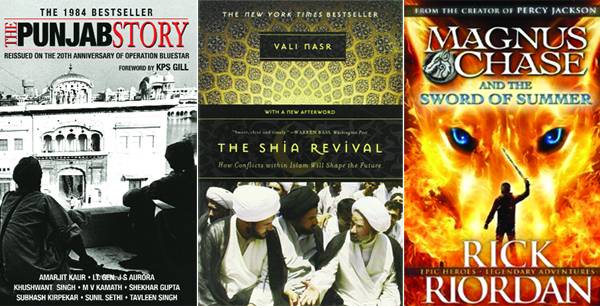
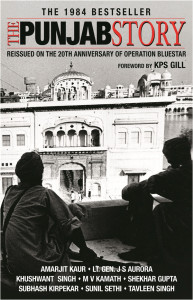
The Punjab Story
Amarjit Kaur
Roli Books Pvt Ltd (paperback), 2005
PRs 550
The Punjab Story is a collection of articles from multiple people and aims to give a different perspective from the point of view of individuals who have observed and studied the events leading up to and culminating in Operation Bluestar. Must read for those interested in history and in hearing from all sides involved in the conflict.
- Foreword by KPS Gill, former Director General of Police (DGP Punjab)
- Khushwant Singh, a prominent Indian novelist and journalist, former Member of Parliament
- Amarjit Kaur, former Member of Parliament, Congress, strong supporter of the government action
- Tavleen Singh, the fiery young journalist who has been covering Punjab since the 1980s
- Shekhar Gupta and Subhash Kirpekar, perhaps the only two young journalists who were eyewitness to the Operation Bluestar
- M V Kamath, veteran journalist
- Sunil Sethi
- White Paper on Operation Bluestar by Government of India
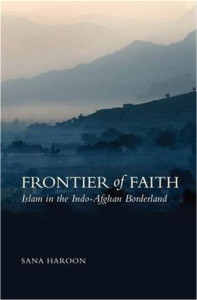
Frontier of Faith
Sana Haroon
Oxford University Press (hardcover), 2008
PRs 3045
Sana Haroon examines religious organisation and mobilisation in the North-West Frontier Tribal Areas, a non-administered region on the Indo-Afghan border. The Tribal Areas was defined topographically as a strategic zone of defence for British India, but also determined to be socially distinct and hence left outside the judicial, legislative and social institutions of greater colonial India. Conditions of Tribal Areas autonomy came to emphasise the role and importance of the mullahs operating in the region, and the mullahs jealously protected this administrative alienation. Despite its great distance from the centres of political organisation in India and Afghanistan, the frontier occasionally functioned as a military organisation ground for both Indian and Afghan anti-colonial activists until independence and partition of the Indian subcontinent in 1947. Thereafter the Tribal Areas maintained status as an administratively and socially autonomous region in both the Afghan and Pakistani national imaginations and cartographic descriptions. The regional mullas continued to contribute to armed mobilisations of national importance in Pakistan and in Afghanistan over the next half century, in return for which nationalist actors supported the mullahs and their personal interest in regional autonomy. This was the hinterland of successive, contradictory jihads in support of Pakhtun ethnicism, anti-colonial nationalism, Pakistani territorialism, religious revivalism, Afghan anti-Soviet resistance, and anti-Americanism. Only the claim to autonomy persisted unchanged and uncompromised, and within that claim the functional role of religious leaders as social moderators and ideological guides was preserved. From outside, patrons recognised and supported that claim, reliant in their own ways on the possibilities the autonomous Tribal Areas and its mullahs afforded.
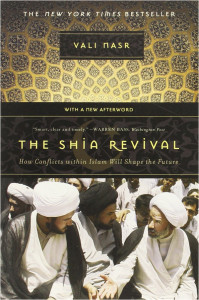
The Shia Revival
Vali Nasr
WW Norton & Company (paperback), 2007
PRs 3695
In Iran, Iraq, Lebanon, and Bahrain, Shia constitute a majority or plurality of the populace, and areas of Pakistan and Saudi Arabia (in the latter, the oil fields) host Shia majorities. Iran’s Islamic Revolution under Ayatollah Khomeini, which rushed Islam to the forefront of non-Islamic consciousness internationally, was a Shia phenomenon. Iranian Middle East researcher Nasr, who teaches, consults, and writes in the US, says that Khomeini was rather a maverick who discountenanced the quietism, ritualism, and celebrator ness of mainstream Shia. If that is a revelation to Westerners, so, probably, are Nasr’s arguments that the Shia have been persecuted and oppressed by the Sunni majority ever since the divergence of the two Islamic strains more than 1,300 years ago, and that Islamic terrorism from well before 9/11 to the current insurgency in post-Saddam Iraq is a tactic of intransigent Sunnism. Nasr never pontificates or accuses, always choosing to show both sides’ reasons for even the most heinous actions. He never so much as hints at what many readers must infer from his presentation—that the US should think again and again and again before attacking Iran. So enlightening and perspective altering that no one concerned about the Middle East should miss reading it.
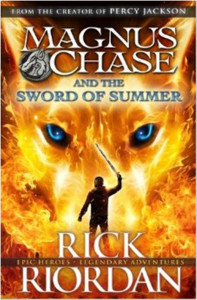
Magnus Chase and the Sword of Summer
Rick Riordan
Disney-Hyperion (paperback), 2015
PRs 995
Magnus Chase has always been a troubled kid. Since his mother’s mysterious death, he’s lived alone on the streets of Boston, surviving by his wits, keeping one step ahead of the police and the truant officers.
One day, he’s tracked down by an uncle he barely knows - a man his mother claimed was dangerous. Uncle Randolph tells him an impossible secret: Magnus is the son of a Norse god.
The Viking myths are true. The gods of Asgard are preparing for war. Trolls, giants and worse monsters are stirring for doomsday. To prevent Ragnarok, Magnus must search the Nine Worlds for a weapon that has been lost for thousands of years.
When an attack by fire giants forces him to choose between his own safety and the lives of hundreds of innocents, Magnus makes a fatal decision.
Sometimes, the only way to start a new life is to die...
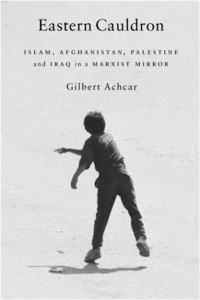
Eastern Cauldron: Islam, Afghanistan, Palestine and Iraq in a Marxist Mirror
Gilbert Achcar
Monthly Review Press (paperback), 2003
PRs 995
The route to any coherent understanding of our time runs through the issues addressed in this collection of essays: the political meaning of Islam, the relation of the West to the Islamic world, the new form of imperialism signaled first by the Soviet occupation of Afghanistan and now by the US occupations of Afghanistan and Iraq, the intractable conflict over Palestine. This volume brings together Gilbert Achcar’s major writings on these issues over the past decades. Achcar’s introductory essay, reflecting on the aftermath of the US invasion of Iraq, integrates these analyses in a major new account of the strategy of US imperialism in the Middle East and its prospects. Achcar’s analyses are supple and inventive, and consistently informed by reflection on rival traditions of political thought and a deep knowledge of the region.

